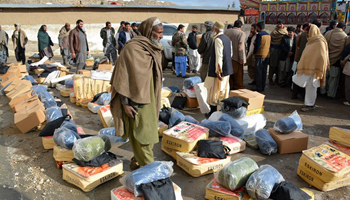
Image provided by Mexico's Presidency shows Mexican President Enrique Pena Nieto preparing to deliver a speech in Mexico City, capital of Mexico, on Jan. 25, 2017. Mexican President Enrique Pena Nieto said Wednesday that his country rejects the U.S. decision to build a border wall and "will not pay for any wall." (Xinhua/Mexico's Presidency)
MEXICO CITY, Jan. 26 (Xinhua) -- New U.S. President Donald Trump on Wednesday signed an executive order to "build a large physical barrier on the southern border" with Mexico, causing outcry from Latin American countries, especially neighboring Mexico.
Mexican President Enrique Pena Nieto said Wednesday that his country rejects the U.S. decision to build a border wall and "will not pay for any wall."
"I regret and condemn the decision of the United States to continue construction of a wall that, for years, has divided us instead of uniting us," he said in a televised message.
"Mexico does not believe in walls. I have said it time and again: Mexico will not pay for any wall," said the Mexican leader.
"Mexico gives and demands respect as the completely sovereign nation that we are," he said.
Pena Nieto also said that he will decide on the next steps based on the final report from the Mexican officials now in Washington, and after consultation with the representatives of the Senate and the National Conference of Governors. He is scheduled to meet with Trump in Washington on Tuesday.
Mexico opposition leader Andres Manuel Lopez Obrador urged his government to file a lawsuit at the United Nations (UN) against the U.S. government for violation of human rights and racial discrimination.
Some Mexican experts also voiced opposition to Trump's decision, saying that building a wall along the U.S.-Mexico border is a costly measure which will not solve the problem of illegal migration.
"It is a solution proposed by a handful of ignorant people," said Alejandro Hope, a Mexican analyst of security matters.
Some "60 percent of illegal migrants enter the United States with a visa," and then overstay their welcome, he said.
The measure seems even more misguided given the fact that Mexican northward migration has decreased due to the recession in the United States, said Hope.
Today, most migrants crossing the border come from Central America, and the best way to curb their numbers would be to boost cooperation with Mexico, the transit route, not to antagonize it, he said.
Raul Benitez Manaut, from the Center for Research on North America at the National Autonomous University of Mexico, said forcing Mexico to foot the bill for the wall is likely to generate more hostility than the wall itself.
"That would definitely create a huge conflict between the two governments," said Benitez, a specialist in bilateral ties.
The price tag will probably run into tens of billions of U.S. dollars because the wall will likely be fitted with high-tech security features, such as sound and heat detectors, video surveillance cameras and drones, he said.
Mauricio Santoro, professor of international relations at the State University of Rio de Janeiro, said the construction of the wall will disrupt trade and destabilize Latin American countries.
"The announcement of the construction of the wall, like all of the measures taken in his first five days in office, confirms yet again that Trump means the extremist, tough and aggressive things he says," he said.
Trump plans to carry out his most radical campaign promises, despite the fact that they will have a very negative impact on trade and political stability throughout the Americas, including Brazil, Santoro added.
"Trump is sending a message to the continent, to show it that it will be treated very roughly and aggressively," said Santoro.
Most Latin American migrants to the United States are from Mexico and Central American countries. The number of Brazilian migrants to the United States is small but has been on the rise in recent years.
"Not all Brazilians in the United States are authorized to be there," said Santoro, adding there is a "real possibility" that a crackdown will "spark a massive wave of deportations."











